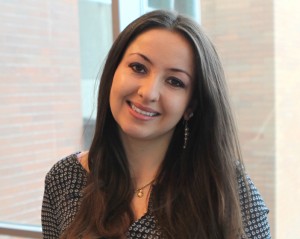
The Society of Nuclear Medicine and Molecular Imaging (SNMMI) annually awards two Bachelor’s Degree Completion Scholarships to support current nuclear medicine technologists pursuing a bachelor’s degree related to their nuclear medicine careers. This year, BC student, Larisa Toderas was one of those two recipients.
Toderas emigrated to the U.S. from Romania at the age of 20 and after working as an au pair, began her studies at Bellevue College. Toderas earned her associate’s degree in Nuclear Medicine Technology from BC in 2013 and immediately set to work on her bachelor’s in Radiation and Imaging Sciences, with a nuclear medicine concentration – while simultaneously working for the Seattle Cancer Care Alliance (SCCA) as a Nuclear Medicine/PET Technologist.
Q: Tell us about your path to becoming a Nuclear Medicine Technologist.
Nuclear Medicine came into my life while at Bellevue College and became the focus of my life. Completing the associate’s in Nuclear Medicine last spring and now the bachelor’s provides me with a solid feeling of empowerment and direction. My goal now is to pursue a master’s degree and to continue expanding my experience in the clinical setting. I recently obtained the CT certification, which now allows me to perform CT exams in addition to the Nuclear Medicine and PET exams. Working with patients provides me with a great deal of happiness and I plan to stay in the clinical setting for a long time.
Q: What pushes you to do more?
Education has been an important aspect of my life since childhood and I have always striven for academic excellence. I understood from a young age that education is the best tool I have to surpass my situation and hopefully, one day, help others as well. I was raised in a small community in Romania and I’ve always been eager to see what is outside my little world. This curiosity brought me first to Bucharest to study Medical Physics at University of Bucharest and then to the U.S. to learn English and immerse myself into an entirely new culture – and then to Bellevue College!
Q: Why Bellevue College?
Bellevue College offered all the classes I needed and provided a great study environment by keeping class sizes small. In addition, it is the only school in Washington that has a Nuclear Medicine Technology program. I was really fortunate that BC also offered a bachelor’s in my area of study and I couldn’t have been happier with the outcome of my studies here. Bellevue College provided me with the tools necessary to find purpose and create the life that best suits my personality.
Q: What would people be surprised to hear about BC?
Bellevue College has some amazing teachers and a state-of-the-art science building. I feel fortunate to have had teachers that promote excellence and provide students with the tools necessary to succeed.
Q: Who is your role model?
I look up to my cousin. I was an impulsive young adult and he taught me the importance of being patient, practical and resourceful, and to seize opportunities as they arise. He was the first in my family to study abroad. He went to Innsbruck, Austria after his studies in Romania to pursue a Ph.D. in Computer Science and now is a research scientist and associate professor at the University of Oslo, Norway.
Q: Do you have a favorite class or teacher here at BC?
My favorite classes have been those taught by Carole Berg and Jennifer Prekeges. They are my favorite teachers and have been great mentors.
Q: Best place to study?
On campus, I like to go to the second floor conference room in the Science building. Off campus, it’s my kitchen table!
Q: What do you like to do in your spare time?
I haven’t had much spare time lately, but I always make time for dinners with friends. I like being surrounded by people that have different interests and views than mine. I enjoy a good conversation, music, movies, cooking, hiking, and yoga.
-by Evan Epstein
What is Nuclear Medicine Technology?
Nuclear medicine is a subspecialty of radiology in which radioactive materials are administered to patients, who are subsequently imaged to identify a variety of disease processes. The chemical nature of the radioactive material causes it to go to a specific part of the body and show the function (rather than just the structure) of that organ. Nuclear medicine technologists provide explanations of the process and answer patient questions as well as administering the radioactive substance and acquiring and processing the resulting images. The newest form of nuclear medicine imaging is called positron emission tomography or PET. Bellevue College offers the only nuclear medicine technology program in the state of Washington!
For more information, please visit: www.bellevuecollege.edu/nucmed/
Last Updated October 3, 2016
